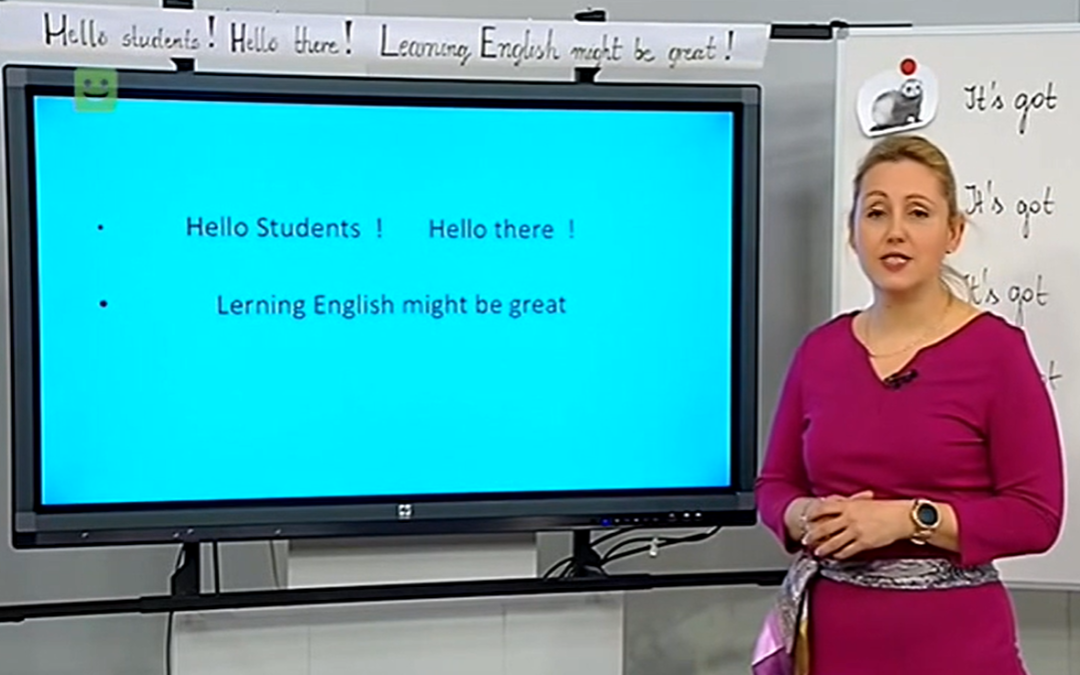With children in Poland stuck at home following the closure of schools three weeks ago and a more recent ban on minors leaving the home unaccompanied, state television has sought to step into the educational gap by broadcasting special lessons presented by real teachers.
Its efforts have, however, faced widespread criticism, in particular over numerous factual errors. Following the backlash, some of the teachers have spoken out about the hurtful ridicule they have faced, and described the slipshod manner in which the public broadcaster, TVP, produced the programmes.
The series of classes, called “Szkoła z TVP” (“School with TVP”), began this week. Teachers have been presenting 25-minute lessons in a variety of subjects, which were broadcast on TV and also made available online.
Yet viewers quickly pointed out that many of the lessons, which are produced in cooperation with the education ministry, contained mistakes. Visual material used in the English classes, for example, contained misspelled words. One lesson began with a graphic saying “lerning [sic] English might be great”.
One clip from a maths class, in which two teachers explain that even numbers can be identified because they are part of a pair, quickly went viral on social media. In another, the teacher mixed up diameter and circumference.
Czy można bardziej popsuć lekcję o liczbach parzystych?Co Wy o tym sądzicie??? Nie mogłam uwierzyć, że telewizja może coś takiego puścić na swojej antenie.www.kingaimatematyka.pl
Opublikowany przez Kinga i Matematyka Poniedziałek, 30 marca 2020
There has also been criticism regarding puerile teaching methods, which have included use of glove puppets. Despite being screened by Poland’s main public television channel, the lessons make limited use of multimedia teaching aids.
Some of the negative remarks have come from teachers themselves. Przemysław Staroń, who was named Teacher of the Year by the education ministry in 2018, told TOK FM that he was “lost for words” after watching TVP’s lessons. They contain “basic errors” and “horrific” delivery, he said.
Karol Dudek-Różycki, chairman of the Polish Association of Teachers of the Natural Sciences, wrote in a letter to the education minister that the classes are “saturated with errors…that are almost unforgivable”. While he “appreciates the enthusiasm” behind the programmes, this alone is not enough.
In an interview with Gazeta Wyborcza, Dudek-Różycki, who is also a lecturer at Kraków’s Jagiellonian University, listed some of the numerous serious mistakes in TVP’s science teaching, and warned that children’s education would suffer as a result.
Many critics have also pointed out that public media, which have been used by the government to propagate its message and criticise opponents, recently received a controversial 2 billion zloty funding boost. Given the resources at its disposal, it is all the more unforgivable to have produced such low-budget teaching programmes, said Staroń.
Meanwhile, in response to the widely mocked clips from TVP’s programming, a whole host of parody versions have sprung up across Polish social media.
“I am afraid to leave the house”
Some of the teachers involved in TVP’s classes have reported that the criticism has had a severe impact on their personal lives. Two of them, speaking anonymously to Onet, say they have been struggling to sleep at night due to their anxiety.
“This has affected my whole life,” said one. “I am afraid to leave the house because someone will recognise me and point and laugh…I regret agreeing to all this.”
The teachers explained that TVP had given limited support to those involved in the programme, who had to prepare their own materials, with one day’s notice, before the first episode was recorded. There was also no help with clothing and makeup, nor any guidance on how to act in front of the camera.
“They shot and edited episodes the same day – and immediately, without checking, sent them to Warsaw,” one of the teachers told Gazeta Wyborcza. “We didn’t even have the opportunity to check how it finally turned out and whether there were any mistakes.”
Some of the teachers were chosen from a school in Białystok. The city’s deputy mayor, Rafał Rudnicki, now says that he regrets the outcome of the programme.
“On the one hand, the teachers have shown that, unfortunately, they were not properly prepared. On the other, there was no editorial team from TVP, to ensure that these lessons did not contain factual errors,” Rudnicki told Gazeta Wyborcza.
The head of the school has now forbidden the teachers from further participation, reported the newspaper. In response to criticism levelled at the show, TVP issued a statement to Onet, saying the project was extremely difficult and that they were supporting the teachers involved.
Staroń, meanwhile, has expressed concern that the failings of TVP have led to an internet “lynching” of the teachers involved.
“It doesn’t surprise me at all that the internet responded with loud laughter,” he told Dziennik Bałtycki. But that “laughter can begin to turn into hateful abuse against the teachers”, he warned. “While we have the full right to criticise, hate is morally unacceptable.”
Main image credit: vod.tvp.pl

Juliette Bretan is a freelance journalist covering Polish and Eastern European current affairs and culture. Her work has featured on the BBC World Service, and in CityMetric, The Independent, Ozy, New Eastern Europe and Culture.pl.




















